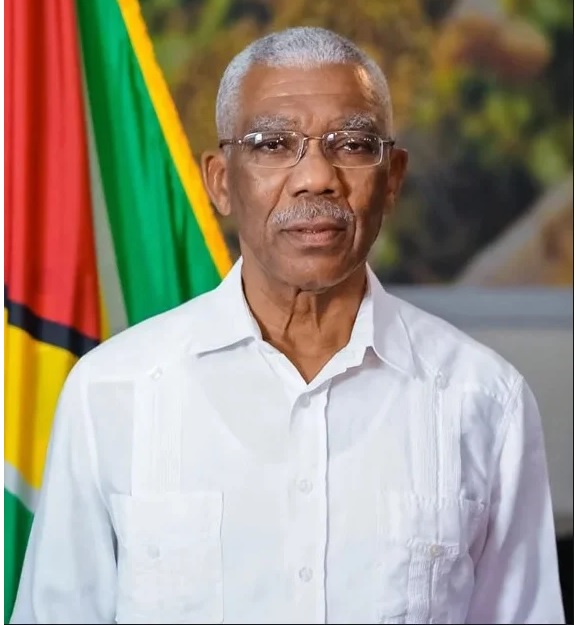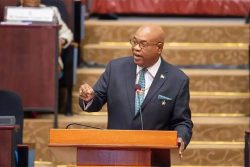Former President David Granger has declared that the processes that took place in the five-month period between elections day and the final declaration of results last year were “necessary to ensure the functioning of the Constitution.”
Granger made the assertion in his New Year’s message as leader of the People’s National Congress Reform (PNCR) last Thursday.
Granger’s message, which released by the party, repeatedly stressed that the coalition administration was proud of its achievements during its tenure of office from 2015 to 2020.
“We believe that the measures we took fortified democracy. The Coalition acted correctly and lawfully throughout the year 2019 to ensure that credible elections could be held in the year 2020 and it will continue its vigorous defence of its election petition in the New Year, 2021,” he said.
Granger and his APNU+AFC coalition have been accused of seeking to benefit from the rigging of the District Four count by Returning Officer Clairmont Mingo on March 5th and March 13th. His counts, the result of a process that was condemned by major observers, would have given a win to the coalition but a court order prevented the final result from being declared and this then led to an agreement for a contentious recount of votes. This was followed by a series of related court actions which made it all the way to the Caribbean Court of Justice (CCJ). The recount result was finally declared on August 2nd by Guyana Elections Commission (GECOM) Chair Justice (ret’d) Claudette Singh, handing victory to the PPP/C.
In his message, the former Head of State declared that the return of the People’s Progressive Party/Civic (PPP/C) to government has seen “an atmosphere of fear and loathing quickly envelope the Public Service” following what he called the “callous and cold-blooded” treatment of innocent worker who had their employment arbitrarily and summarily terminated without explanation or compensation.
He contrasted this behaviour with what obtained under his government and went on to detail what he called “people-centered policies” and their attendant impact, including a “proud record of continuous economic growth… with the highest growth being recorded at 4.1 percent in 2018.”
Notably, however, the party leader sought to absolve himself and his government of any responsibility related to the two-year legislative crisis and five month electoral impasse which gripped the nation.
According to Granger, it was all the fault of GECOM and Singh.
“The delay in holding elections…was due to the Elections Commission’s unpreparedness. The Constitution…gives responsibility for the conduct of the elections exclusively to the Commission,” he maintained, before adding that despite the coalition’s insistence that credible elections be conducted at the earliest possible time, the Chairman of the Commission indicated only on 19th September, 2019 that elections could not be held before the end of February, 2020.
There is no mention of his party’s demand as championed by his representatives on the Commission that a full house-to-house registration process be conducted prior to elections nor is there mention of the delay in appointing a Chair of the Commission following the Caribbean Court of Justice’s decision that Granger had illegally appointed Singh’s predecessor, Justice James Patterson, to the post. Singh was only appointed in July of 2019.
Granger also claimed that a High Court application by an elector on March 5th prevented the acceptance of the report by the Chief Election Officer (CEO) which would have enabled a declaration’ of results leading to the installation of a president. “The Chief Justice granted the request for an injunction to prevent the presentation of the Chief Elections Officer’s Report. This was followed by a series of legal actions in the Supreme Court, the Court of Appeal and the Caribbean Court of Justice during the months of April to July,” he stated.
There was no mention of the significant concerns surrounding the Region Four count or that this “series of legal actions” originated from supporters of the coalition, including a candidate in one instance.
It is, however, noted that following an action brought by another elector on 22nd June 2020, the Appeal Court held that the words “more votes” in the Constitution means “more valid votes”.
“The Coalition’s insistence that only valid and credible votes should determine the outcome of the Elections was thereby vindicated,” he said, before adding that the Court of Appeal determined that a final credible count did not mean a mere numerical tabulation of votes but an assessment of the credibility of votes.
This second assertion was not included in any of the rulings made public by the Court.
Granger continues by defending the actions of CEO Keith Lowenfield, who submitted a report disqualifying thousands of votes and declaring the APNU+AFC winner.
“The recount process was intended to determine both the quantitative and qualitative nature of the votes cast at the Elections and to determine a final ‘credible’ count,” he said while concluding that that recount revealed a plethora of irregularities and, at the end, it became evident that the results did not satisfy the standard for ‘credible’ elections.
According to Granger, despite this the GECOM Chair issued a ‘Declaration’ on 2nd August to the effect that the list submitted by the PPP/C had received the greatest number of votes which in accordance with the law resulted in the APNU+AFC Coalition’s loss of office and the installation of the PPP.
Consequently, the Coalition presented a petition to the Supreme Court to demand the accurate tabulation of the valid votes cast in the elections of 2020.
Following this presentation of the events over the five month period, the former Head of State concluded that while the processes between 2nd March and 2nd August may seem to have been protracted they were necessary to ensure the functioning of the Constitution and “…the preservation of justice and the peace and prosperity of Guyana.”









